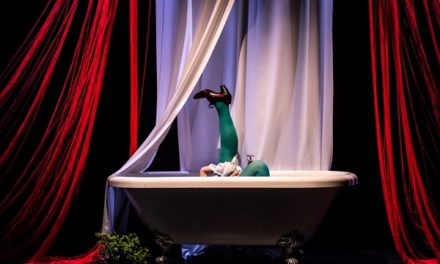Following the huge success of Benedict Lombe’s Shifters, which transfers soon to the West End, the Bush Theatre is riding high. Now this venue’s latest exploration of the Black-British experience tells a really lively and emotionally deep story about Nigerians in London. Faith Omole, whose first and as yet unperformed play, Kaleidoscope, won the prestigious Alfred Fagon Award last year, arrives with bang with My Father’s Fable. Since Omole is also an actor, and has appeared in the Channel 4 laugh-fest, We Are Lady Parts, it’s no surprise that her debut is both a comedy and an acute look at the role of women in the family. It also stars BAFTA-award-winning Rakie Ayola as one of the most powerful mothers on the current British stage.
The daughter of Ayola’s character, Favour, is Peace, a 20-something black teacher, who lives with the mixed heritage Roy, a techie whiz on computers. About a year ago, Peace’s father died of a heart attack and she feels it’s right that she looks after her mother. Peace’s parents came to London from Nigeria, but both she and her mother are surprised when Bolu, a Nigerian writer who claims to be Peace’s half-brother, gets in touch and wants to visit. While Roy and Favour are wary of this newcomer, Peace immediately takes him to heart. But is he really all he claims to be?
This family drama begins in comedy as not only Bolu, but also Favour, move into Roy’s house and there are a lot of jokes about strong-minded Nigerian women and complex living arrangements: is it fair, argues Roy, that he should be the one who is relegated to the living room sofa bed? Amid the laughs, other more serious material slowly pops out. The drama centres on Peace, and her ready acceptance of Bolu, which raises the question of how we can be drawn to the children of our own father, even if the mother is different, and how that emotional pull is always so strong.
But Peace is not only attracted to her long-lost half-brother, who no one in the surviving London family seemed to know even existed, but also has to process the news that her beloved father had two families, one in London, and the other in Nigeria. Omole shows how this reassessment of the meaning of her family life adds to her fragility, and emphasizes how vulnerable she is to the controlling force that is her mother. At the same time, Peace has to face another problem: Roy gets a job offer which involves him leaving the country — should Peace follow him or stay near her mother?
Omole paints a convincing picture of the confusions of bereavement and its strains on any family’s life. She also adds some strong thoughts on culture: when Peace talks to Bolu she realizes not only that her preconceptions of Nigeria are wrong, but also that she knows next to nothing of that country’s culture. She has never visited the land of her parents, claiming to be terrified of flying, she cannot cook its food, and — unlike Favour and Bolu — cannot speak Yoruba. As the play develops, she takes her first cautious steps in exploring Yoruba language and mythology.
The tug of love between Peace, Favour, Bolu and Roy is beautifully written, with enormous perceptiveness and great good humour too. As well as being a play about ideas of family, this is also a study of character. The figure of Bolu not only challenges stereotypes of Nigerian males, but also enables Peace, an only child, to think about the warmth of having a brother. He also bonds with Roy, which gives us an image of male comradeship. Mind you, the loudest laughter on press night was a joke about Caribbean men — a reminder of tensions between African and Jamaican cultures.
The most powerful character on stage, and the one responsible for most of the humour is Favour, a larger than life creation who dominates both family and the stage. She is wily, manipulative and great at arguing her corner. But since Bolu reminds her of her own troubled past, she also has the most to lose as her daughter starts asking questions about why she never had any more children. The sense that we are haunted by the people and events of long ago is beautifully staged in Rebekah Murrell and Taiwo Ava Ayebola’s heartfelt production, which features XANA’s eerie music and Peace’s dead father’s ghostly voice.
On designer TK Hay’s naturalistic set, whose ceiling has an ominous crack running across it, the cast is excellent: Ayola gives a powerfully controlled performance as the controlling Favour, with some great comic timing. Tiwa Lade’s Peace has a questing quality of someone knocked sideways by grief and the arrival of an unexpected blended family member, while Theo Ogundipe’s thoughtful and cautious Bolu exudes mystery and intensity. Holding things together, in many senses, is Gabriel Akuwudike’s Roy, who has a real onstage rapport with Lade. My Father’s Fable is both fun and a profoundly felt family drama.
This review first appeared on The Arts Desk.
This article appeared in Sierz on June 21, 2024, and has been reposted with permission. To read the original article, please click here.
This post was written by the author in their personal capacity.The opinions expressed in this article are the author’s own and do not reflect the view of The Theatre Times, their staff or collaborators.
This post was written by Aleks Sierz.
The views expressed here belong to the author and do not necessarily reflect our views and opinions.


















